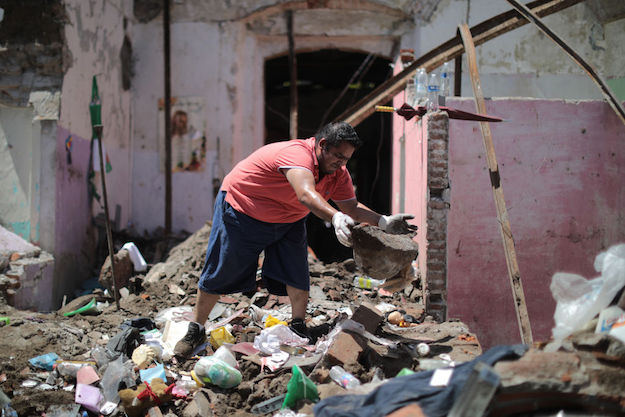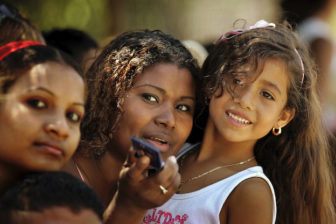When Avelino Mendez, a local political leader, stopped by San Gregorio Altapulco to inspect the damage done by last week’s severe earthquake, he expected to find the southern Mexico City community grieving for its 13 dead.
They were mourning. But they were also irate, and chased the portly chief of the Xochimilco borough through the streets, pelting him with stones and insults.
“They treated him like a criminal,” said Sergio de los Santos, one of the farmers in the area, who grows greens like lettuce, spinach and herbs on artificial islands called chinampas.
The scene from San Gregorio Altapulco played out repeatedly across Mexico as politicians appeared in earthquake-damaged areas. The magnitude 7.1 quake that struck on Sept. 19 and claimed more than 300 lives came as the country was already seething over a string of corruption scandals, and violence hit highs not registered since such statistics started being kept in 1997.
With this disaster and the resulting loss of life – due at least in part to graft, which weakened enforcement of building codes – patience with politicians boiled over.
Elected leaders should take note. The last time citizens manifested this much anger at the political establishment was after the 1985 earthquake, which also struck on Sept. 19 and left more than 6,500 dead.
Frustration with officials at that time spurred citizen participation in politics, helped to usher in the end of one-party rule under the PRI (Institutional Revolutionary Party), and brought the left to power in the capital in 1997 – and has kept them there ever since.
This time, the contrast between brave and effective citizen-driven recovery efforts, which included all-night rescue operations to search for the dead and care for the wounded, and the country’s irresponsible and unresponsive politicians was again glaring.
“While rescue workers dirty their hands … (some politicians) wash theirs of errors and possible crimes,” wrote Juan E. Pardinas, director of the Mexican Institute for Competitiveness, in the newspaper Reforma.
Disgust with political leaders is such that even when they do the right thing, they get little credit. President Enrique Peña Nieto traveled often to impacted areas in states outside Mexico City, but a survey in Reforma showed only 35 percent of Mexicans approved of his earthquake response.
The numbers were similar for the governors of impacted states and the mayor of Mexico City. Members of the Navy and Army got higher marks for their rescue efforts: 86 percent and 84 percent, respectively.
Interior Minister Miguel Osorio Chong was jeered and jostled as he approached a collapsed mill in Mexico City. Peña Nieto was booed by students in his home state – which is rare, as such dissidence there is often co-opted or suppressed. “Grab a shovel!” one person yelled.
Last week’s earthquake hit at a time when Mexico is taking a beating internationally. U.S. President Donald Trump has made a habit of disparaging the country, promised to build a border wall, and threatened to pull out of NAFTA, the free trade agreement that Mexico is even now renegotiating with its two North American partners.
Trump’s chief of staff, John Kelly earlier this month mused about Mexico collapsing and becoming like Venezuela. The mood is such in Mexico that Mexicans weren’t entirely in disagreement with his inflammatory comments.
“Mexico in its own way has already collapsed,” said Carlos Bravo Regidor, professor at CIDE, a public university. “If you look at the number of people murdered, displaced, disappeared, the murders of women, there’s no way to argue Mexico is still standing. And this is before the earthquake.”
Charges in the media and among analysts that politicians have used promises of earthquake relief to gain political points have further tarnished the political class. These accusations surfaced in Oaxaca state – hit by a Sept. 7 tremor, then jolted again on Sept. 19 – and also in the state of Morelos, to the south of Mexico City.
In Morelos, near the epicenter of the recent earthquake, many towns saw homes reduced to rubble, but state police were suspected of diverting assistance sent by private citizens to government centers. This made the hashtag #RoboComoGraco, or Rob Like Graco, referring to state Gov. Graco Ramírez, trend on Twitter. (Ramírez denies the accusations.)
From almost the first hours after the quake, Mexicans on social media demanded that the money given to the country’s political parties – some 6.8 billion pesos or $375 million – be repurposed for earthquake relief.
Many party leaders concurred, though somewhat cynically. The PRI – which previously denounced such a move as populism – later announced an proposal to save money by scrapping “plurinominales,” or members elected to Congress from party lists.
Such a move would perpetuate the PRI in majority positions in both chambers of Congress, according to analysts. This move to give up public money presented other problems, analysts said.
“Mexican politicians responded to the earthquakes the only way they know how: by making it about themselves,” said Esteban Illades, editor of the Mexican magazine Nexos. “They made promises to curb campaign spending, but since campaign spending in Mexico also includes a lot of dirty money, they aren’t really worried.”
Amid the ugliness of petty politicking in the wake of disaster has emerged unity among ordinary Mexicans, who have removed rubble from collapsed buildings, donated food, drinks and supplies to those displaced, and taken in the homeless. The newspaper Reforma summed this up with the headline: “Citizens take the reins.”
The response has again raised memories of the 1985 earthquake, when an inept government left citizens to fend for themselves, and they rose to the occasion. Many of those affected or even left homeless later moved into politics, starting with low-level positions like block captain, then becoming an important part of the 1988 Cuauhtémoc Cárdenas presidential campaign as he split with the PRI, captured the public imagination and nearly captured the presidency.
That was then. What comes next for Mexico now remains uncertain.
Analysts wonder whether political parties will be able to co-opt the emerging citizen movement – or whether Mexicans will turn their drive to help each other into a fight for a better country.
“The country would be different, if people fought corruption like they are fighting to rescue people,” said Ilán Semo, history professor at the Iberoamerican Unviersity. “This shows that there is a society that is willing … that this power exists. It could be used for other things.”
Others see encouraging signs in the number of young people pitching in to help.
“We’ve spoken badly of young people. … But young people are the ones responding in an extraordinary way,” said Bishop Ramón Castro of Cuernavaca in his most recent Sunday homily.
Others are downright optimistic, believing that with so many Mexicans pitching in and realizing their own strength, change is inevitable.
“It will change us as citizens,” said Víctor Hugo Arzate, a consultant leading a team of volunteers into Xochimilco armed with care packages of food, water, blankets and construction materials. “We’ll be better now at picking our leaders.”
—
Agren is a freelance journalist based in Mexico City








